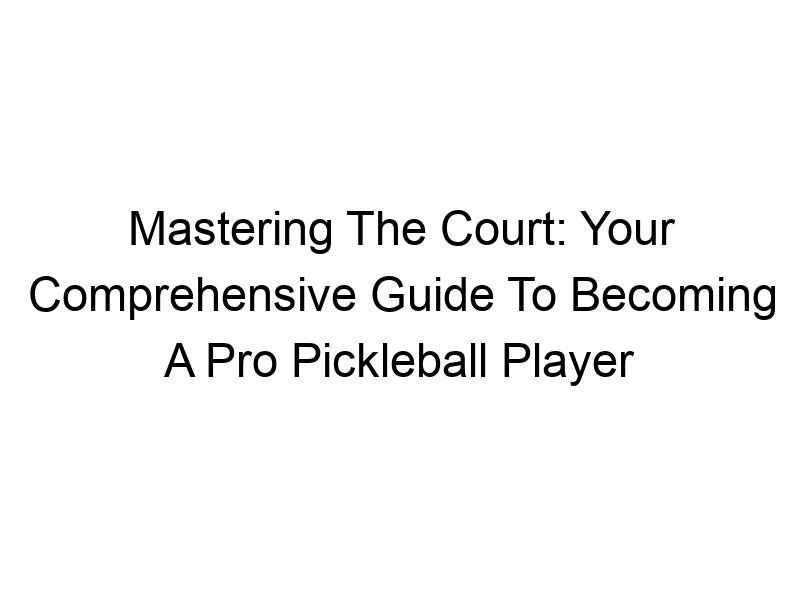Pickleball’s explosive popularity has many aspiring to professional status. This guide explores how to become a pro pickleball player, covering everything from fundamental skills to advanced strategies, mental fortitude, and the business side of the sport. We’ll delve into training regimens, tournament preparation, and even the importance of networking, leaving no stone unturned in your journey to pickleball mastery.
Pickleball, played on a badminton-sized court, combines elements of tennis, badminton, and table tennis. Two or four players use solid paddles to hit a perforated plastic ball over a net. The underhand serve is a key differentiator, and the “kitchen” (a non-volley zone) adds a unique strategic layer. Mastering the serve, dinking, and volleys is crucial for success.
Points are scored only by the serving team. Games are typically played
to 11 points, win by two. Understanding scoring nuances and different formats (singles, doubles, mixed doubles) is crucial. Professional players often play best-of-three or best-of-five game matches.
Developing Fundamental Pickleball Skills
Grip and Stance
Proper grip and stance are foundational. Experiment with different grips to find what’s comfortable and allows for both power and control. A balanced athletic stance enables quick reactions and powerful shots. Professional players constantly refine their grip and stance to optimize performance.
Serving Techniques
The underhand serve is unique to pickleball. Mastering different serve types—from high-arching serves to low, deceptive serves—is key to disrupting opponents’ rhythm and gaining an advantage. Practice different serve speeds and placements to make your serve unpredictable.
The Art of the Dink
The “dink” is a soft shot that keeps the ball low over the net. Mastering the dink allows for strategic control of the rally and can wear down opponents. Professional players often use dinks to set up more aggressive shots.
Volleying Mastery
Volleying involves hitting the ball in the air before it bounces. It requires quick reflexes, accurate timing, and precise hand-eye coordination. Professional players execute volleys with remarkable power and precision.
Advanced Shot Techniques
Beyond the basics, developing more advanced shots like the drop shot, the third-shot drop, and the overhead smash are crucial for taking control of points and creating scoring opportunities. Professional players often use deceptive shots to surprise and outmaneuver opponents.
Physical Conditioning and Training
Developing Strength and Endurance
Pickleball demands agility, strength, and endurance. Incorporate cross-training, including running, weight training, and core strengthening exercises, to build the physical foundation for professional play. Top professionals maintain rigorous training regimes.
Footwork Drills
Quick reflexes and agile footwork are critical. Practice various footwork drills such as side shuffles, forward lunges, and quick changes of direction to improve agility and court coverage. Pro players dedicate significant time to footwork training.
Strategic Practice and Court Awareness
Strategic practice goes beyond repetitive drills. Focus on scenario-based training, simulating match situations to improve decision-making under pressure. Developing court awareness, anticipating your opponent’s moves, is key.
Mental Game and Strategy
Developing Mental Resilience
Professional pickleball requires mental toughness. Develop strategies to manage stress and stay focused during intense matches. Professional players often employ mindfulness techniques and visualization to improve mental resilience.
Strategic Thinking and Adaptability
Strategic thinking involves anticipating your opponent’s moves and adapting your strategy accordingly. Learn to recognize patterns in opponents’ gameplay and adjust your approach. Professional players are masters of strategic thinking and on-court adaptation.
Competitive Mindset
Cultivate a competitive mindset that blends confidence with discipline. Learn to manage pressure, stay positive, and learn from losses. Professional players have a strong and resilient competitive mindset.
Tournament Preparation and Competition
Choosing the Right Tournaments
Start with local tournaments to gain experience. Gradually progress to higher-level competitions, using them as benchmarks for skill improvement. Professional players strategize carefully about tournament selection.
Managing Tournament Stress
Tournament play can be stressful. Develop strategies for managing pre-game nerves and maintaining composure during matches. Professional players often employ relaxation techniques to alleviate stress.
Analyzing Your Performance
After each tournament, critically analyze your performance, identify weaknesses, and focus on areas for improvement. Professional players use performance analysis to consistently refine their skill.
The Business of Professional Pickleball
Building a Brand
Professional players often develop personal brands to attract sponsorships and endorsements. Develop a social media presence, create engaging content, and build a network within the pickleball community.
Securing Sponsorships
Approach potential sponsors, showcasing your skills and highlighting your potential as a brand ambassador. Professional players often have dedicated agents or managers to manage their sponsorships.
Networking within the Pickleball Community
Network with other players, coaches, and tournament organizers. Building strong relationships within the pickleball community opens doors to opportunities.
Essential Equipment and Gear
Choosing the Right Paddle
The right paddle greatly impacts your gameplay. Experiment with different paddle weights, materials, and grip sizes to find the perfect fit for your style. Top players often use custom-designed paddles.
Pickleball Balls and Footwear
Choose high-quality pickleball balls that meet tournament specifications. Invest in comfortable, supportive athletic footwear designed for court sports. Pro players choose specialized equipment.
Frequently Asked Questions
What are the most common mistakes beginners make in pickleball?
Beginners often make mistakes in their serve, failing to get it in or lacking consistency. They may also struggle with dinking, hitting too hard or too high, and lack proper footwork. Poor court positioning and lack of strategic thinking are other common issues.
How long does it take to become a pro pickleball player?
The timeline is highly individual, depending on natural talent, dedication, and training. While some naturally gifted players might progress faster, most professionals dedicate years to honing their skills and competing regularly.
What are some effective training drills for improving my pickleball skills?
Focus on drills improving your serve, return of serve, dinking, volleying, and court coverage. Shadow practice can improve footwork. Partner drills focusing on specific shots are also very beneficial.
How important is mental strength in professional pickleball?
Mental strength is paramount. Professional pickleball is mentally demanding, requiring focus, strategy, adaptability, and resilience under pressure. It’s a key differentiator between average and elite players.
How can I find a pickleball coach?
Local pickleball clubs or community centers often have instructors or coaches. Online searches can also reveal coaches in your area with various levels of expertise.
What is the typical prize money in professional pickleball tournaments?
Prize money varies greatly depending on the size and prestige of the tournament. Larger events offer significantly higher prize pools than smaller, local tournaments.
What is the best way to gain exposure as an aspiring pro pickleball player?
Create a strong online presence through social media, a website, or YouTube channel, highlighting your skills and personality. Participate in as many tournaments as possible to build a reputation and attract sponsorships.
Final Thoughts
Becoming a professional pickleball player requires dedication, perseverance, and a strategic approach to training, competition, and self-promotion. By mastering fundamental skills, refining your strategy, and building a strong mental game, you can significantly increase your chances of success. Remember to focus on continuous improvement, embrace challenges, and network effectively within the pickleball community. The journey may be long, but with dedication and passion, your dream of becoming a pro pickleball player is within reach. Start honing those skills today, and who knows—you might be the next big name in pickleball!

